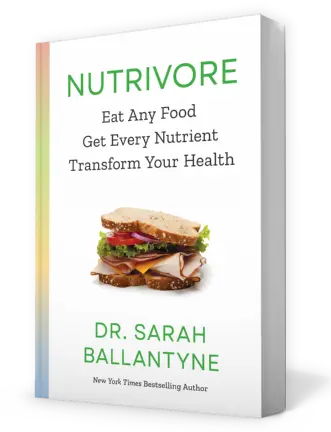Table of Contents[Hide][Show]
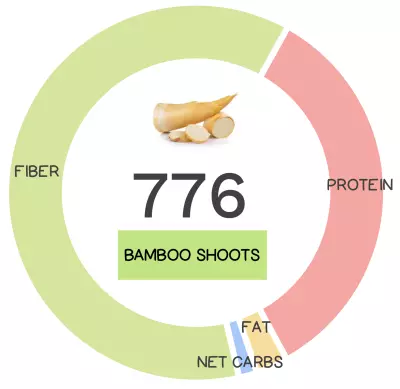
Although bamboo is typically considered panda food (making up over 98% of their diet!), bamboo shoots (also called “bamboo sprouts”) are a popular ingredient used as vegetables in Asian cuisine as well. In fact, they are so popular in Asian dishes, they are sold in a variety of forms, including canned, dried, fermented, frozen, pickled, roasted, and fresh, where they provide a much-loved sweetness and crunch to many dishes, especially stir-fries. If you can believe it, there is even bamboo shoot juice and beer! And though we may think of bamboo as being hollow or empty, it’s actually full of nutrition! However, because its culinary use is relatively non-existent in many parts of the world, its potential remains unexploited. Oh shoot! (Hyuck)
Bamboo shoots are young bamboo plants that would eventually become a full-grown bamboo plant if given the chance, but instead are harvested when roughly 8 to 12 inches (20 to 30 cm) in height, for use as food.
Bamboo is a group of large woody grasses belonging to the Poaceae family, with over 1250 species, that grow best in tropical and subtropical climates. It is considered one of the most economically important plants in the world and is prized for its versatility, sustainability and environmental benefits. Its importance is evident in the names it has been given in various cultures. For instance, the Chinese call it “friends of the people,” Vietnamese refer to it as “my brother” and in India it is known as “green gold,” while in other places it is simply considered a “miracle plant.” When it comes to food, only the bamboo shoots of some (but not all) bamboo species are edible (only ~100 or so species are regularly harvested for their edible shoots). Bamboo shoots are young bamboo plants that would eventually become a full-grown bamboo plant if given the chance, but instead are harvested when roughly 8 to 12 inches (20 to 30 cm) in height, for use as food. Owing to its natural antibacterial and antifungal properties, bamboo thrives without the use of pesticides which is great for consumers. On the flip side, bamboo shoots contain toxic cyanogenic glycosides, which means that they need to be properly cooked (or canned) before they’re consumed. With proper preparation, they are a great addition to the diet. In fact, tribal communities have been consuming bamboo shoots as food and medicine since ancient times. So, next time you’re making up your grocery list, why not give this exotic food a try?
Nutrivore Score for Bamboo Shoots – 776
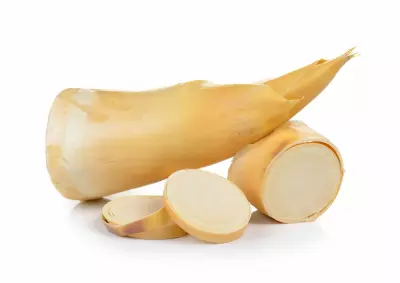
Bamboo shoots have a Nutrivore Score of 776, making them a high nutrient-dense food! Plus, they are a low-carb and low-calorie-density food; the calorie count of bamboo shoots is 41 calories per cup!
Per serving, bamboo shoots are a best source (>50% daily value) of polyphenols; an excellent source (20-50% daily value) of copper, dietary fiber, and vitamin B6 (pyridoxine); and a good source (10-20% daily value) of manganese, potassium, protein, vitamin B1 (thiamin), vitamin E, and zinc.
Ditch Diets. Embrace Nutrients. Start with These 5 Free Guides.
Sign up for the free weekly Nutrivore Newsletter and get 5 high-value downloads—delivered straight to your inbox—that make healthy eating simple and sustainable.
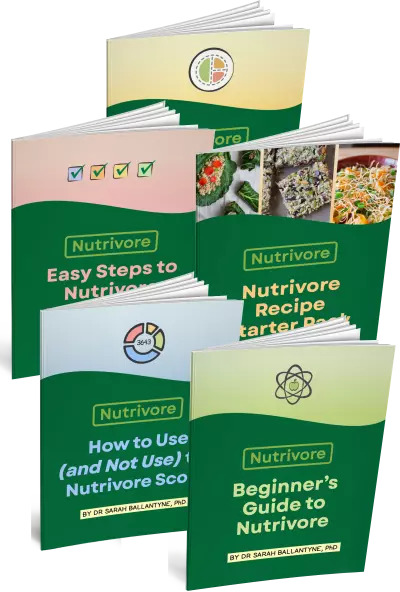
Bamboo Shoot Nutrition Facts
One serving of bamboo shoots is standardized to 1 cup, sliced or about 151 grams (5.3 ounces). When you cook bamboo shoots, the volume remains relatively unchanged: 1 cup raw is roughly equivalent to a little over 1 cup cooked.
Bamboo Shoot Nutrition Facts Per Serving
| Bamboo shoots, raw | Nutrivore Score: 776 | Nutrient Density: High |
|---|---|---|
| Serving Size: 1 cup, sliced (151 grams) | Protein: 5.6 grams | Net Carbohydrates: 0.3 grams |
| Calories: 41 | Total Fat: 0.5 grams | Dietary Fiber: 10.2 grams |
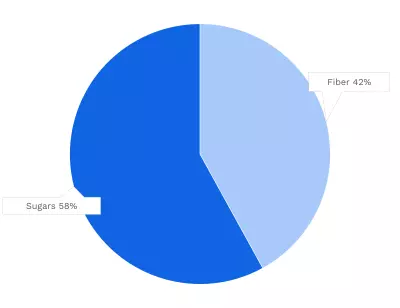
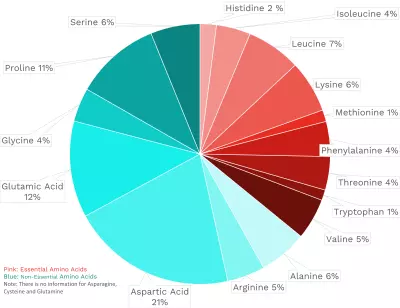
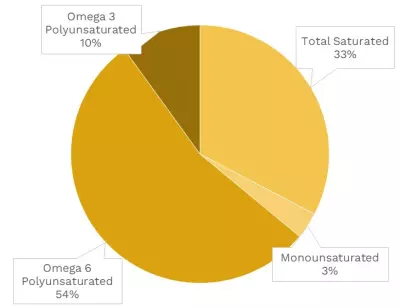
| VITAMINS | ||
|---|---|---|
| Vitamin A | 1.5 μg RAE | 0% DV |
| Vitamin B1 (Thiamin) | 226.5 μg | 19% DV |
| Vitamin B2 (Riboflavin) | 105.7 μg | 8% DV |
| Vitamin B3 (Niacin) | 0.9 mg | 6% DV |
| Vitamin B5 (Pantothenic Acid) | 0.2 mg | 5% DV |
| Vitamin B6 (Pyridoxine) | 362.4 μg | 21% DV |
| Vitamin B7 (Biotin) | 1.2 μg | 4% DV |
| Vitamin B9 (Folate) | 10.6 μg | 3% DV |
| Vitamin B12 (Cobalamin) | 0.0 μg | 0% DV |
| Vitamin C | 6.0 mg | 7% DV |
| Vitamin D (D2 + D3) | 0.0 μg | 0% DV |
| Vitamin E | 1.5 mg | 10% DV |
| Vitamin K | 0.0 μg | 0% DV |
| Choline | 0.0 mg | 0% DV |
| Myo-Inositol | ~ | ~ |
| CoQ10 | ~ | ~ |
| FUNCTIONAL FATS | ||
|---|---|---|
| MUFA | 0.0 g | 0% DV |
| ALA | 30.2 mg | 2% DV |
| EPA + DHA | 0.0 mg | 0% DV |
| CLA | ~ | ~ |
| Linoleic Acid | 0.2 g | 1% DV |
| MCT’s | 0.0 g | ~ |
| MINERALS | ||
|---|---|---|
| Calcium | 19.6 mg | 2% DV |
| Copper | 286.9 μg | 32% DV |
| Iodine | ~ | ~ |
| Iron | 0.8 mg | 4% DV |
| Magnesium | 4.5 mg | 1% DV |
| Manganese | 395.6 μg | 17% DV |
| Phosphorus | 89.1 mg | 7% DV |
| Potassium | 804.8 mg | 17% DV |
| Selenium | 1.2 μg | 2% DV |
| Sodium | 6.0 mg | 0% DV |
| Zinc | 1.7 mg | 15% DV |
| PHYTONUTRIENTS | ||
|---|---|---|
| Carotenoids | 18.1 μg | ~ |
| Polyphenols | 670.4 mg | ~ |
| Phytosterols | 25.8 mg | ~ |
| Glucosinolates | ~ | ~ |
| Thiosulfinates | ~ | ~ |
| Betalains | ~ | ~ |
| AMINO ACIDS & PEPTIDES | ||
|---|---|---|
| Taurine | ~ | ~ |
| Ergothioneine | ~ | ~ |
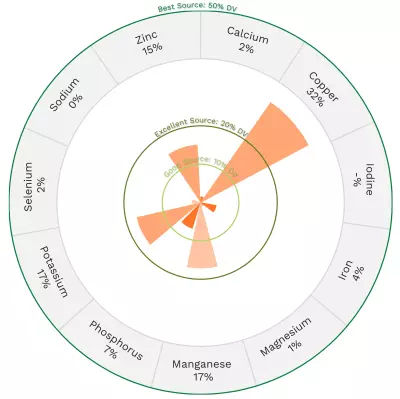
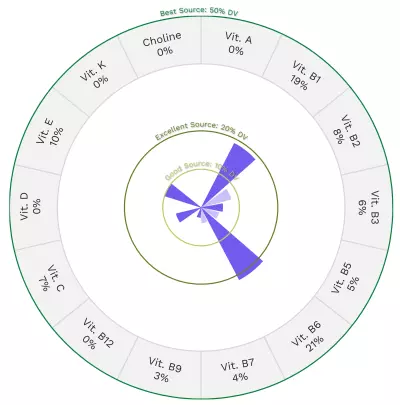
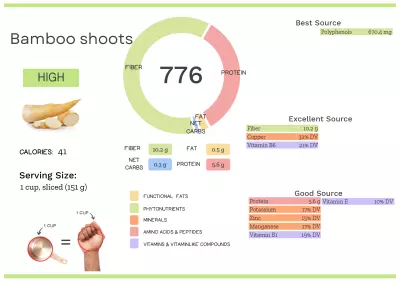
Bamboo Shoot Nutrition Varies With Cooking and Processing
The Nutrivore Score of bamboo shoots varies based on method of preparation and processing. For the most part, the canned version is what is familiar to most people. An important note about bamboo shoots is that they need to be cooked (or canned) before they’re consumed (due to the fresh shoots containing toxic cyanogenic glycosides).
| NUTRIVORE SCORE | |
|---|---|
| Bamboo shoots, canned, drained solids | 420 |
| Bamboo shoots, cooked, boiled, drained, with salt | 773 |
| Bamboo shoots, cooked, boiled, drained, without salt | 729 |
| Bamboo shoots, raw | 776 |
Surprised that bamboo shoots are THAT nutritious? Maybe your friends will be too!
Health Benefits of Bamboo Shoot Nutrients
Let’s take a closer look at all of the best and excellent source of nutrients found in a 1-cup serving of bamboo shoots and see how they benefit our health.
Bamboo Shoots Provide 670.4 mg of Polyphenols
Bamboo shoots are a best source of polyphenols, providing 670.4 mg of polyphenols per 1-cup serving!

Polyphenols play a huge role in protecting against cancer, heart disease, diabetes, asthma, osteoporosis, neurodegenerative diseases, and other conditions associated with oxidative stress. In fact, a major reason foods like red wine and olive oil (as well as diets rich in both, such as the Mediterranean diet) show up as so beneficial may be due to their high polyphenol content! Along with chronic diseases, supplementing with polyphenols has been shown to protect against infections and reduce the signs of aging. Polyphenols exert their most potent effects by acting as antioxidants—preventing cellular damage by neutralizing hazardous oxygen radicals and improving cellular health as a result (which, in turn, benefits virtually every system in the body). As a result of their antioxidant properties, polyphenols also boost the immune system and protect against both chronic and acute diseases. In addition, polyphenols can help regulate enzyme function, stimulate cell receptors, modulate the functions of inflammatory cells (including T and B lymphocytes, macrophages, platelets, and natural killer cells), alter adhesion molecule expression, affect nerve cells and cardiac muscle cells, and exert antiviral effects. Learn more about polyphenols here.
Bamboo Shoots Provide 10.2 g of Fiber
Bamboo shoots are an excellent source of dietary fiber, providing 10.2 g of fiber per 1-cup serving!

Fiber serves as substrate for the trillions of microbes that inhabit our digestive tracts, collectively referred to as the gut microbiome. Through their metabolism of fiber, these resident microbes benefit us in a whole host of ways, including aiding digestion, vitamin production, detoxification, regulation of cholesterol metabolism, providing resistance to pathogens, immune regulation, neurotransmitter regulation, regulation of gene expression, and more! In fact, every human cell is impacted by the activities of our gut microbes. A healthy gut microbial community is essential for our health. And, the converse is also true: An aberrant gut microbiome has been linked to conditions as wide-ranging as cancer, obesity, diabetes, cardiovascular disease, anxiety, depression, neurodegenerative diseases, autism, autoimmune disease, ulcers, IBD, liver disease, gout, PCOS, osteoporosis, systemic infections, allergies, asthma, and more!
Fiber has other benefits, like regulating peristalsis of the intestines (the rhythmic motion of muscles around the intestines that pushes food through the digestive tract), stimulating the release of the suppression of the hunger hormone ghrelin (so we feel more full), and slowing the absorption of simple sugars into the bloodstream to regulate blood sugar levels and avoid the excess production of insulin. Fiber also binds to various substances in the digestive tract (like hormones, bile salts, cholesterol, and toxins) and, depending on the type of fiber, can facilitate either elimination or reabsorption (for the purpose of recycling, which is an important normal function for many substances like bile salts and cholesterol), both of which can be extremely beneficial—if not essential—for human health.
The recommended dietary intake for fiber is 14 grams per 1000 kcal, which translates to 28 grams of fiber, if you eat a 2,000 calorie per day diet. However, there are many studies showing greater benefits from even higher levels of intake. Lear more about fiber here.
Bamboo Shoots Provide 32% DV Copper
Bamboo shoots are also an excellent source of copper, providing 32% of the daily value per 1-cup serving!

Copper is a trace mineral that’s essential for all living organisms. Copper serves as a component of numerous enzymes and proteins in the body, giving it diverse roles in the growth, development, and maintenance of various organs (including the heart and brain), bone, and connective tissue. Copper is also involved in glucose and cholesterol metabolism, helps regulate gene expression, can scavenge free radicals, and is needed for the production of red blood cells. Learn more about copper here.
Bamboo Shoots Provide 21% DV Vitamin B6 (Pyridoxine)
Bamboo shoots are an excellent source of vitamin B6 (pyridoxine), providing 21% of the daily value per 1-cup serving!
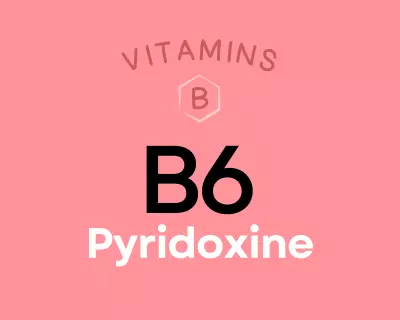
Vitamin B6 (pyridoxine) is a group of six water-soluble compounds with a similar chemical structure, all of which can be converted into their active form of pyridoxal 5’-phospate (PLP). Over 100 different enzymes require vitamin B6 in order to carry out their various functions in protein metabolism, fatty acid metabolism, neurotransmitter production, gluconeogenesis, hemoglobin synthesis, the release of glucose from glycogen, and energy metabolism (particularly the production of ATP in the Krebs cycle). Research suggests vitamin B6 may help protect against cardiovascular disease and certain cancers, could reduce the risk of depression among the elderly, and even reduce symptoms of morning sickness and PMS. Learn more about vitamin B6 here.
Want to know the top 500 most nutrient-dense foods?
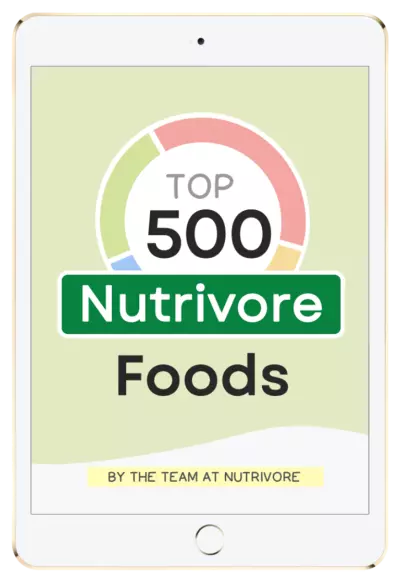
Top 500 Nutrivore Foods
The Top 500 Nutrivore Foods e-book is an amazing reference deck of the top 500 most nutrient-dense foods according to their Nutrivore Score. Think of it as the go-to resource for a super-nerd, to learn more and better understand which foods stand out, and why!
If you are looking for a quick-reference guide to help enhance your diet with nutrients, and dive into the details of your favorite foods, this book is your one-stop-shop!
Buy now for instant digital access.
How Much Bamboo Shoots Should We Eat Per Day?
Although bamboo is typically considered panda food, bamboo shoots are widely used in Asian cuisine in numerous forms.
Every serving of fresh, whole vegetables or fruit we eat daily reduces the risk of all-cause mortality by 5% to 8%, with the greatest risk reduction seen when we consume five or more servings per day. In fact, consuming 800 grams of vegetables and fruits daily reduces all-cause mortality by 31% compared to eating less than 40 grams daily. A 2017 meta-analysis showed that 2.24 million deaths from cardiovascular disease, 660,000 deaths from cancer, and 7.8 million deaths from all causes could be avoided globally each year if everyone consumed 800 grams of veggies and fruits every day.
Eating vegetables and fruit in abundance lowers risk of cancer, cardiovascular disease, type 2 diabetes, obesity, chronic kidney disease, osteoporosis and bone fragility fractures (including hip fracture), cognitive impairment and dementia (including Alzheimer’s disease), neurodegenerative diseases, asthma, allergies, chronic obstructive pulmonary disease, age-related macular degeneration, cataracts, glaucoma, depression, ulcerative colitis and Crohn’s disease, rheumatoid arthritis, inflammatory polyarthritis, non-alcoholic fatty liver disease, acne, seborrheic dermatitis, and lowers markers of inflammation. Learn more in Importance of Vegetables and Fruit.
Covering half of your plate with a variety of vegetables (and three quarters of your plate if your starchy food is a root vegetable or winter squash) at each meal is a simple way to easily achieve the goal of 5 or more servings of vegetables daily.
It’s always best to mix up the veggies you eat day to day (aiming for a wide variety of different vegetables and fruits throughout the week), and bamboo shoots definitely have a place at the table.
Easily track your servings of Nutrivore Foundational Foods!

The Nutrivore Weekly Serving Matrix
The Nutrivore Weekly Serving Matrix digital resource is an easy-to-use and flexible weekly checklist designed to help you maximize nutrient-density and meet serving suggestions of Nutrivore foundational foods, all without having to weigh or measure your foods!
Includes a 22-page instructional guide and downloadable interactive guides.
Buy now for instant digital access.
cITATIONS
Expand to see all scientific references for this article.
Chongtham N, Bisht MS, Laishram M. Bioactive compounds in bamboo shoots: Health benefits and prospects for developing functional foods. International Journal of Food Science & Technology. 2013. Vol 49(6):1425-1431. doi:10.1111/ijfs.12470
USDA Food Central Database: Bamboo shoots, raw
Watanabe T, Kioka M, Fukushima A, Morimoto M, Sawamura H. Biotin content table of select foods and biotin intake in Japanese. Int J Anal Bio-Sci. 2014. Vol 2(4):109-125.


